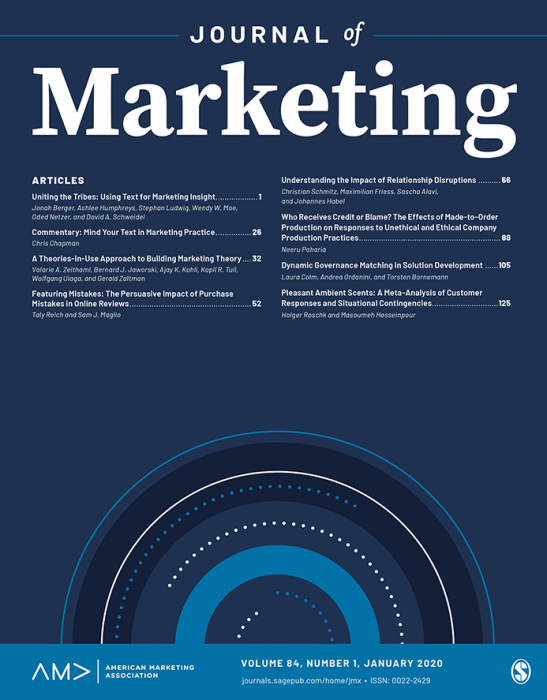咖啡因对消费支出的影响
IF 10.4
1区 管理学
Q1 BUSINESS
引用次数: 6
摘要
咖啡因是世界上最受欢迎的兴奋剂,世界上很大一部分人每天都通过咖啡、茶、苏打水和能量饮料摄入咖啡因。消费者经常在摄入咖啡因后或同时在网上或实体店购物。越来越多的咖啡馆和一些零售商店设有店内咖啡吧并提供免费含咖啡因饮料的现象进一步促进了这一点。这项研究考察了购物前摄入咖啡因对购买行为的影响。在现场(在不同国家的多家零售店)和实验室进行的一系列实验结果表明,在购物前喝一杯含咖啡因(与不含咖啡因)的饮料会增强冲动,从而购买更多的商品和更高的支出。这种效应在“高享乐”产品中更强,而在“低享乐”产品中减弱。这些发现对于管理者理解店内和/或周围看似无关的行为(如咖啡因摄入)是如何影响消费的很重要。从消费者的角度来看,虽然适量的咖啡因摄入对健康有积极的好处,但咖啡因摄入对消费可能会产生意想不到的负面经济后果。因此,试图控制冲动消费的消费者应该在购物前避免饮用含咖啡因的饮料。本文章由计算机程序翻译,如有差异,请以英文原文为准。
Caffeine’s Effects on Consumer Spending
Caffeine is the world's most popular stimulant and is consumed daily by a significant portion of the world's population through coffee, tea, soda, and energy drinks. Consumers often shop online and in physical stores immediately after or while consuming caffeine. This is further facilitated by the increasing prevalence of coffee shops and by the phenomenon of some retail stores having in-store coffee bars and offering complimentary caffeinated beverages. This research examines how caffeine consumption before shopping influences purchase behavior. The results of a series of experiments conducted in the field (at multiple retail stores across different countries) and in the lab show that consuming a caffeinated (vs. noncaffeinated) beverage before shopping enhances impulsivity in terms of more items purchased and higher spending. This effect is stronger for “high-hedonic” products and attenuated for “low-hedonic” products. These findings are important for managers to understand how a seemingly unrelated behavior (i.e., caffeine consumption) in and/or around the store affects spending. From a consumer perspective, although moderate amounts of caffeine consumption can have positive health benefits, there can be unintended negative financial consequences of caffeine intake on spending. Thus, consumers trying to control impulsive spending should avoid consuming caffeinated beverages before shopping.
求助全文
通过发布文献求助,成功后即可免费获取论文全文。
去求助
来源期刊

Journal of Marketing
BUSINESS-
CiteScore
24.10
自引率
5.40%
发文量
49
期刊介绍:
Founded in 1936,the Journal of Marketing (JM) serves as a premier outlet for substantive research in marketing. JM is dedicated to developing and disseminating knowledge about real-world marketing questions, catering to scholars, educators, managers, policy makers, consumers, and other global societal stakeholders. Over the years,JM has played a crucial role in shaping the content and boundaries of the marketing discipline.
 求助内容:
求助内容: 应助结果提醒方式:
应助结果提醒方式:


